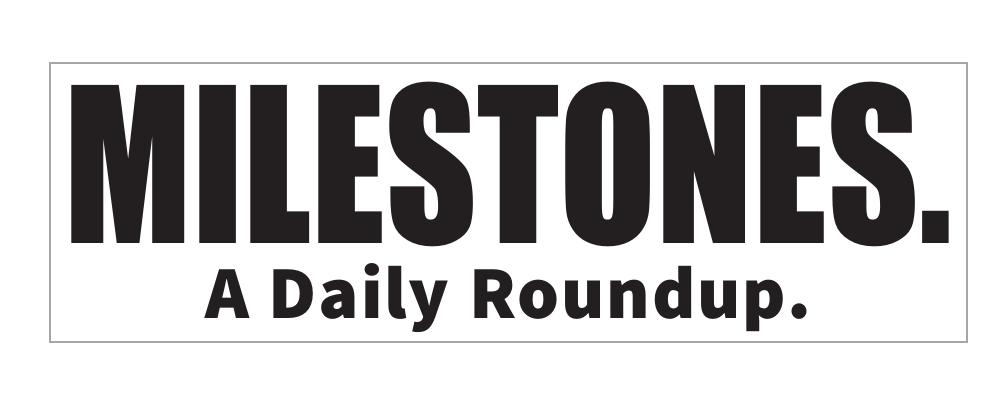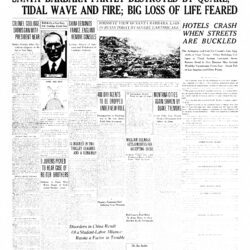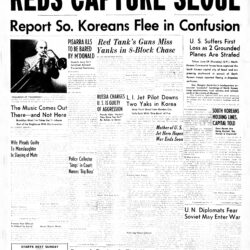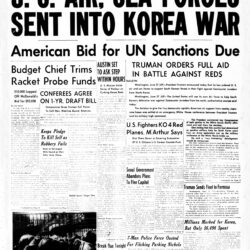
Milestones: Monday, October 23, 2023

AFTER SENECA FALLS — THE FIRST-EVER NATIONAL WOMEN’S RIGHTS CONVENTION TOOK PLACE in Worcester, Massachusetts on Oct. 23, 1850. Suffragists and members of the Anti-Slavery Society organized the two-day event, which brought in more than a thousand delegates from 11 states. Two years earlier, in July 1848, the Seneca Falls Convention in New York, — the first women’s rights convention in the United States — had launched and laid the groundwork for a national women’s suffrage movement. The 1850 event’s organizers and attendees faced stiff opposition and pushback from the American public, who saw nothing wrong in withholding the vote from women. But the suffragists were building a movement that would bear fruit some 70 years later, with the 1920 passage of the 19th Amendment, giving women the right to vote. After the 12th convention, held in the nation’s capital in 1869 (after the Civil War) a rift developed over the question of extending suffrage to Black men as well.
The National Woman Suffrage Association’s founders, Elizabeth Cady Stanton and Susan B. Anthony opposed the Fourteenth and Fifteenth Amendments to give African American men the vote, believing that giving women equality with men was a more urgent issue.
✰✰✰
CHECHEN ATTACK IN THEATER — A MOSCOW THEATER WAS BESIEGED on Oct. 23, 2002, when a group of about 50 Chechen rebels stormed the venue, interrupting a musical and taking 800 hostages. As the second act began of a sold-out performance of “Nord Ost,” an armed Chechen man fired a machine gun, the cue for the terrorists, including women with explosives strapped to themselves, to identify as members of the Chechen army. Their only demand: that the Russian military withdraw from Chechnya, a Russian republic north of the Caucasus Mountains. The predominantly Muslim Chechnya region had been embroiled in a protracted war for independence from Russia. The Chechen and Russian fighters continued a cycle of retaliative attacks, including the alleged 2004 bombing of a Moscow subway.
Russian President Vladimir Putin, who has now been in power 23 years, was elected in 2000 in large part because he was a hardliner on Chechnya who vowed not to negotiate with terrorists. Putin bore down even harder on the region after the theater attack.
✰✰✰
ANOTHER DEMOCRATIC DYNASTY — ADLAI EWING STEVENSON, THE ELDEST, BORN Oct. 23, 1835 in Kentucky, was the 23rd vice president of the U.S. (1893–97). He was the grandfather of Adlai E. Stevenson, the unsuccessful Democratic candidate for president in 1952 and 1956, and the great-grandfather of Adlai Stevenson III, who also was strong in the Democratic party, until his death in 2021. The eldest Adlai Stevenson served as vice president during the second, non-consecutive administration of President Grover Cleveland. Before that, Stevenson had served in Congress for two non-consecutive terms, and had a conspicuous role in the congressional debate over the disputed presidential election of 1876 between Rutherford B. Hayes and Samuel J. Tilden. An electoral commission wound up deciding that election in favor of Hayes.
The youngest namesake in the Adlai Stevenson dynasty is Adlai Stevenson V, born in 1994 and thus still in his twenties. According to LinkedIn, Adlai V has made a career in technology as a senior data engineer in the Chicago area.
✰✰✰
HUNGARIAN INDEPENDENCE — HUNGARY DECLARED INDEPENDENCE from Soviet rule on Oct. 23, 1989. Hungary’s declaration as an independent republic happened 33 years after Russian troops crushed a revolt that the people had staged against Soviet Rule. Hungary’s Constitution from 1949 had defined the Eastern European nation as a socialist people’s republic. Parliament purged Stalinist elements from that constitution. Acting head of state Matyas Szuros made the declaration in front of tens of thousands of Hungarians at Parliament Square.
Hungary held free elections March 1990, the results of which removed the Communist Party to the opposition ranks for the first time since the 1950s.
✰✰✰
THE FATHER OF CANNING — HOME COOKS WHO CAN THEIR VEGETABLES AT HARVEST TIME MIGHT BE INTERESTED IN 18th CENTURY INVENTOR NICOLAS APPERT, born Oct. 23, 1752. This French inventor, chef, chemist and confectioner created a way of heating foods and sealing them in airtight containers, and won a 12,000-franc award from the French government, which also bestowed the title “Benefactor of Humanity” on Appert in 1812, for his many inventions, one of which was the bouillon tablet.
Appert’s birthday of Oct. 23 is now observed as canning day. Nowadays, many stores sell Mason or Bell canning jars and accessories; some pressure cooker brands also have a setting for canning.
✰✰✰
CARNAC THE MAGNIFICENT — TV ICON JOHNNY CARSON, born Oct. 23, 1925 was for decades a television talk show host. Working for various radio and TV shows, such as “Who Do You Trust?” Carson first appeared on “The Tonight Show” in 1958 and in 1962 became the permanent host when his predecessor, Jack Paar, resigned. Carson hosted “The Tonight Show” for almost three decades (when he retired in May, 1992), along with his sidekick pals Ed McMahon and bandleader Doc Severinsen. Carson blended his talents for interviewing a wide range of guests and celebrities and expanding the comic angle beyond his opening monologue, which he characteristically concluded with a mimed golf swing. One of his most belonged recurring sendups was Carnac the Magnificent, a turban-toting psychic who could answer questions contained “in a hermetically-sealed envelope”, by holding the envelope at an angle to his forehead.
Among Carson’s most frequent guests were Bob Hope, Joan Rivers, Joey Bishop, David Brenner ,Jerry Lewis and David Lettermen. Joan Rivers and comedian Jay Leno were also frequent guest hosts; and Leno took over the show entirely in 1992.
See previous milestones, here.
Leave a Comment
Leave a Comment






